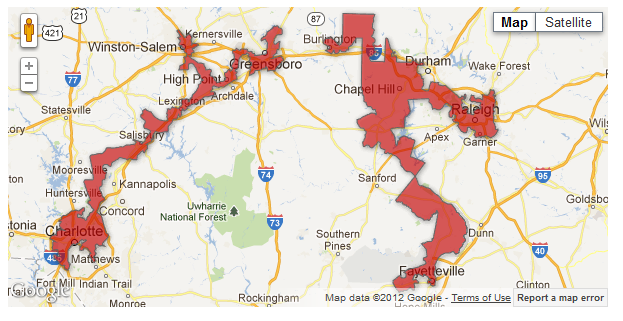North Carolina sticks out on national stage -- for suspicions of gerrymandering

By Sarah Ovaska, NC Policy Watch
This post, up over at Governing magazine, takes a look at a recent study by a geospatial software firm that found that North Carolina has some of the oddest looking Congressional districts around.
Azavea, the geospatial software firm mentioned above, didn't come right out and say that districts were gerrymandered, a bit of a loaded term, but instead examined the districts to see how geographically compact the states were.
North Carolina found itself leading the pack, with some of the least compact and spread out Congressional districts in the country. Only Louisiana, Hawaii, and Maryland topped us in having funny-shaped, geographically spread out districts, according to the Azavea analyst.
The Governing post is a bit wonky -- as one would expect -- but highlights how crazy-shaped these districts can get by showing two districts linking North Carolina’s urban populations.
Here in North Carolina, the redistricting process is carried out by the state legislature and was and has always been one of the most politically contentious things the legislature does, no matter which party controls the General Assembly.
In other states, there's been attempts to take politics out of the equation, or at least tamper it down, by having non-partisan panels or courts develop the maps instead of elected state lawmakers.
The Azavea study found that states that take an approach like North Carolina end up with less-compact districts while the independently-drawn districts tend to be more compact.
It's a point that Pulitizer Prize-winning journalist Hedrick Smith made in his new book, "Who Stole the American Dream," and one he brought up Tuesday when he spoke in Raleigh at a N.C. Policy Watch's Crucial Conversation luncheon. (Click here for video of Smith’s talk.)
From Smith’s talk in Raleigh:
We now have a political apportionment system which is now run by the politicians which is gerrymandering Congressional and legislative districts so that there are safe Democrats and safe Republican districts. You put either party in power and they work it to their advantage.
Why is that a bad thing? Smith goes on, and explains that he thinks it's what caused the eradication of political moderates in politics.
You'd be better off having competitive districts and politicians would have to appeal to the middle.
So, do you agree with Smith? Disagree? Tell us.
Tags
NC Policy Watch
A project of the N.C. Justice Center, N.C. Policy Watch is a news and commentary outlet dedicated to informing the public and elected officials as they debate important issues and to improving the quality of life for all North Carolinians.
